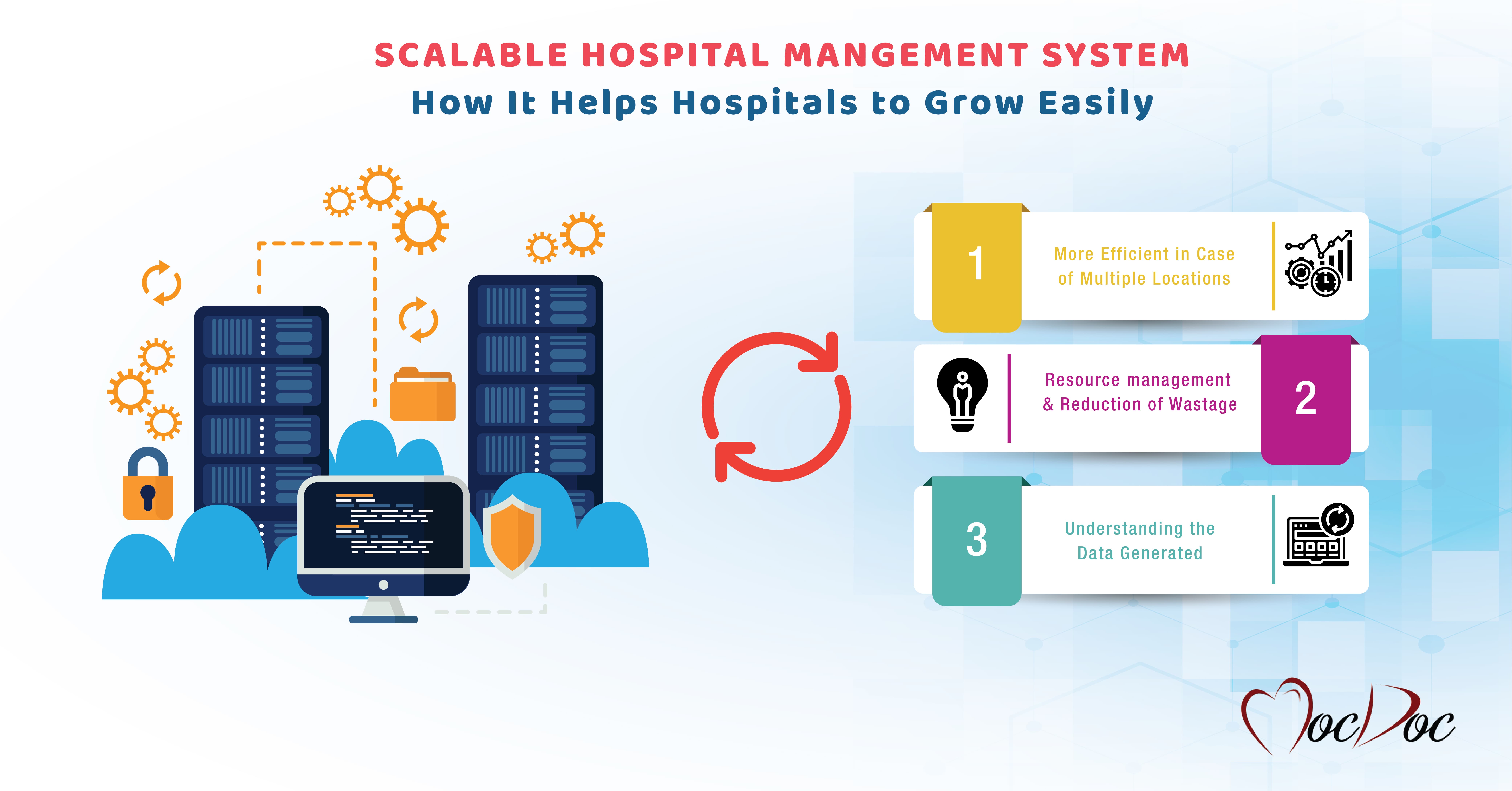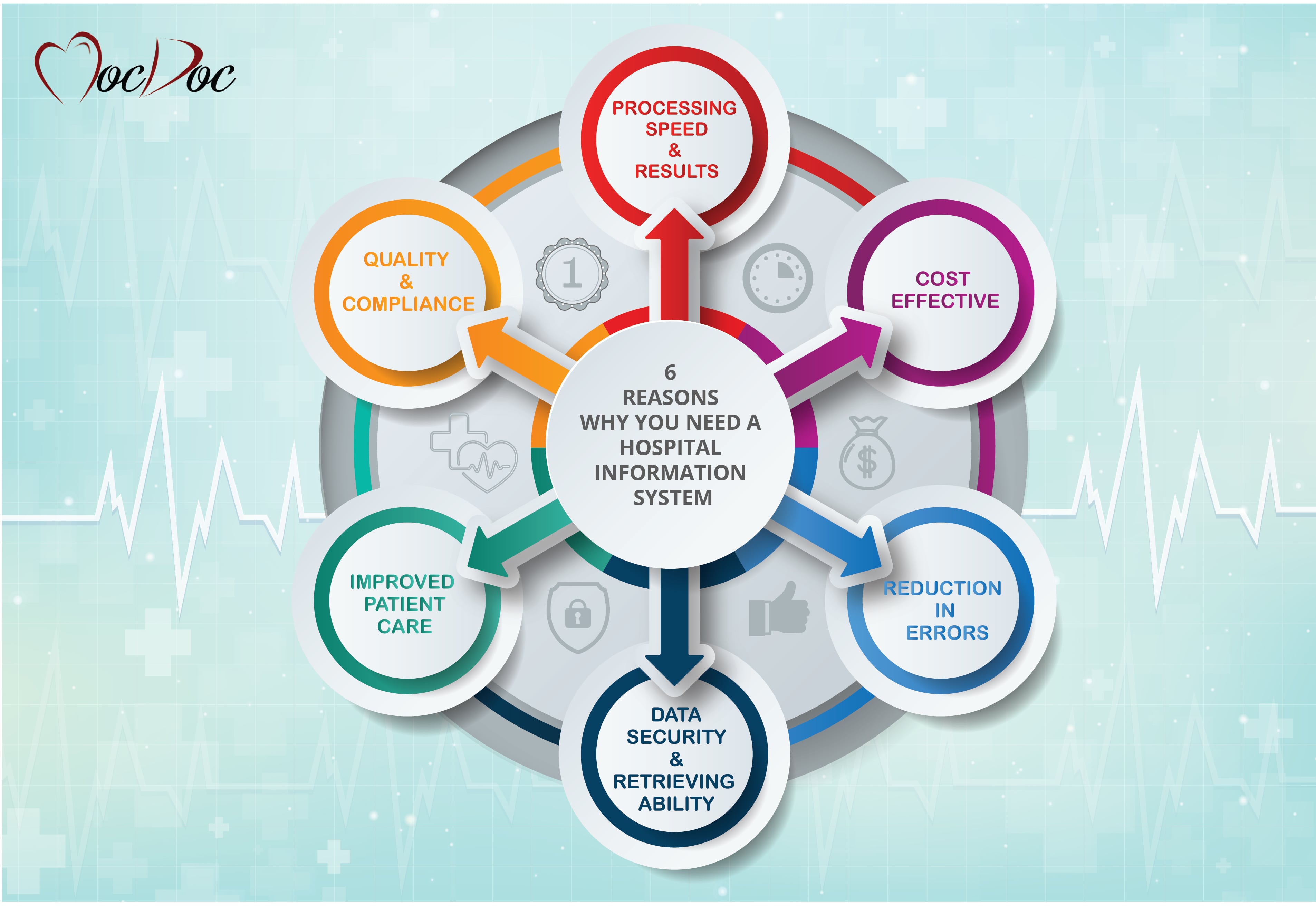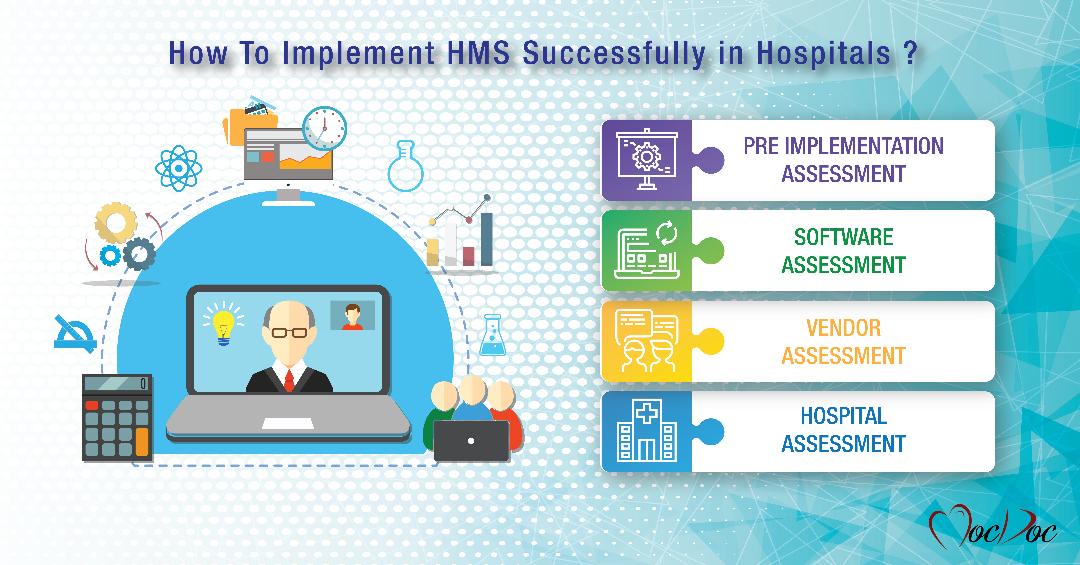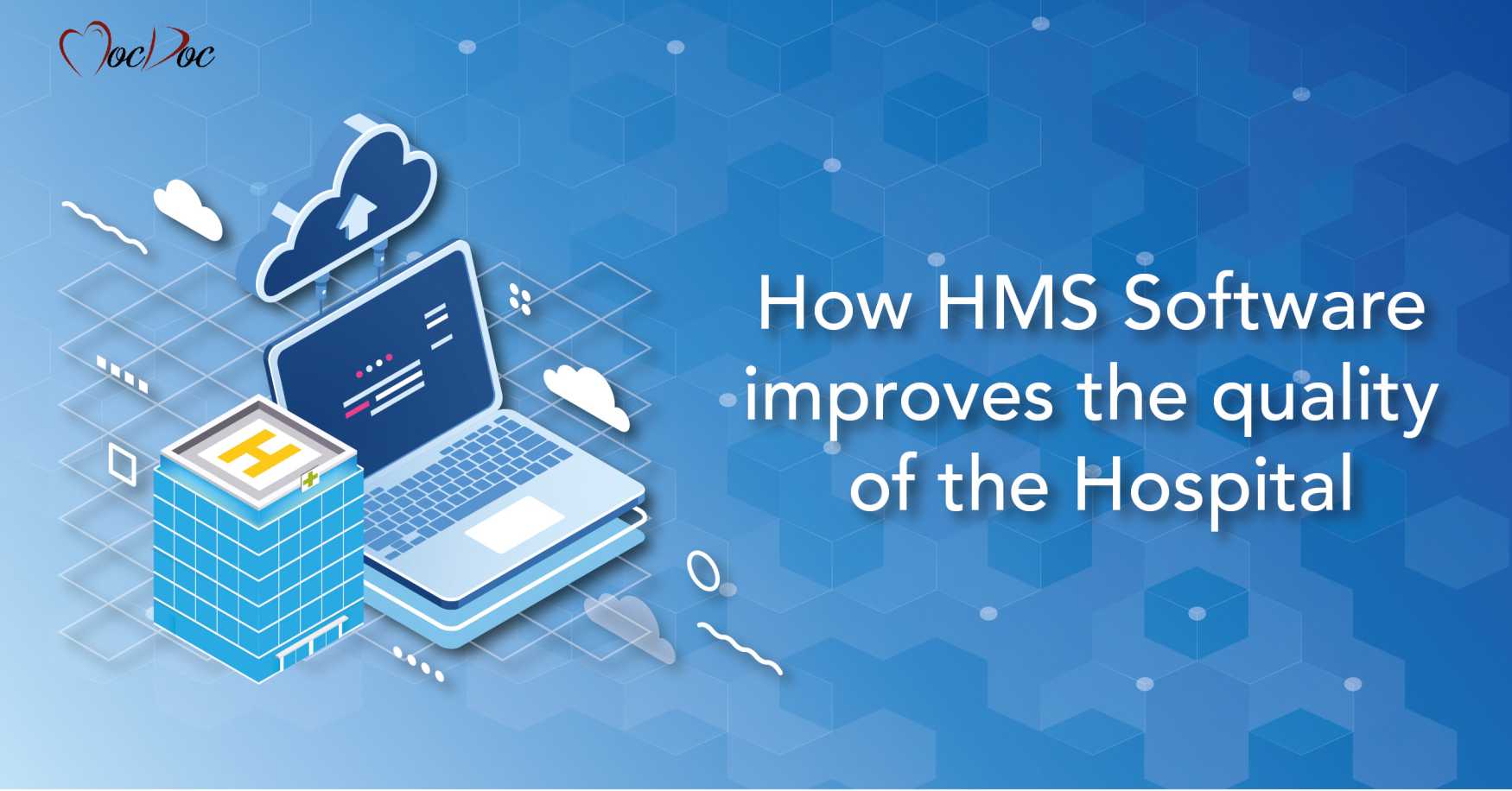MocDoc's Offerings
7 things your Hospital information system must have
Published By
Sanjana
2020070313:39:30
Category HMS
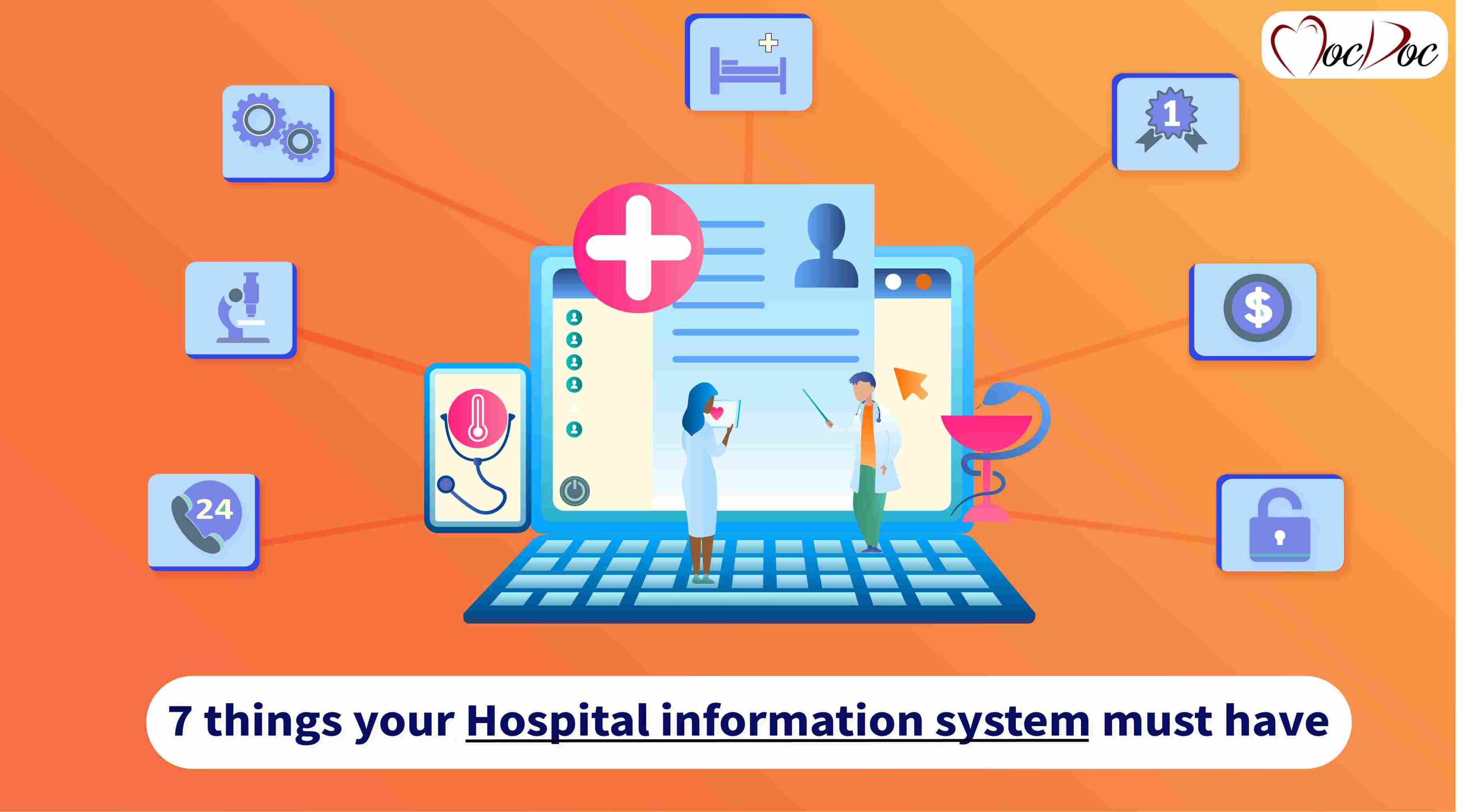
A flexible and efficient Hospital Information Management System has a vital role in every hospital in the case of a health system. Healthcare professionals are adapting to the latest technology developments to keep their IT infrastructure high. HIS helps healthcare organizations to overcome any complicated challenges they face in the current healthcare industry.
In this blog, let's check out what the Hospital Information System is and what other productive things your HIS should include, benefiting your hospital.
What is a Hospital Information System?
HIS (Hospital Information System), otherwise termed a Clinical Information System, is an integrated and comprehensive information system developed to manage the financial, administrative, and clinical aspects of hospitals. Every hospital sticks with Hospital Management System software to manage their data related to hospital inventory and patient records efficiently. The hospital information system software helps in controlling the data in most healthcare departments, namely financial, inpatient, Operation Theater, nursing, radiology, clinical, laboratory, outpatient, materials, pharmaceutical, and pathology.
Why do you need a Hospital Management System?
An efficient, cost-effective, and reliable system is needed, and they are considered to be any healthcare or hospital's backbone. One of them on the list is the hospital information system software. Let's check out the importance of the Hospital Management System below.
● Higher revenue management
● Enhanced clinical decision making
● The best way to make your hospital technically advanced
● Enhanced data security
● Eliminate errors and can monitor each detail instantly.
● Higher reputation through good quality ratings.
● An affordable option for every hospital.
● No chances of errors as HMS cut down the workforce.
● Increased retrieve-ability and data security
● Enhanced efficiency and patient care.
Hospital Information System Features:
The primary use of the Hospital Information Management System is to manage & take care of healthcare management. The Hospital information management system has brought up patients, hospital staff, nurses, and doctors to add all assets and information anywhere and anytime. The efficient and advanced hospital information management system has many great features, and below are some of them you have to look for while choosing a Hospital Information system software for your healthcare needs.
Appointment:
For a patient to be on-boarded, hassle-free appointments are the first step they require. Appointment scheduling features help the patients book their appointments online from anywhere, which you can cut down the time and emergencies.
Appointment Scheduling enables the patients to know the availability of radiologists, doctors, or other healthcare specialists. It means the patients can book their appointments online quickly based on the time they require to meet the doctor. This is open for both offline and online modes added with instant updates on the appointment scheduling process.
The appointment feature enables the patient to have a family ID so that they can easily search for any appointment feature by simply selecting their family ID. There are different modes of payment support, and the amount can be paid through installment schemes. It helps to reduce redundancy.
IP, OP, and OT all in one integrated:
Hospital Information Management System comes integrated with three critical features Inpatient, Outpatient, and Operation Theatre management. It includes MIS reports, asset management, ward and room management, nurse and doctor assigning, and more. Outpatient management deals with the management of every outpatient department's requirements.
The outpatient appointment management makes sure that the workload is evenly distributed across different caregivers and doctors in the clinic. The benefit of appointment management is to encourage patient care through timely follow-ups, decrease unnecessary wait times, and enhance the relationship of the patient with the hospital. The hospital information management system supports various appointment creation through the call center, telephone, walk-ins, and online patient portals. The module is an innovative approach to help multiple doctors take care of their all-day outpatient management.
Inpatient management services are to offer excellent quality care to patients who are in the vulnerable and acute stage of their ailment. The inpatient management module in the HIS takes care of module admissions, bed allocation and bed availability, discharge and transfer of patients, and more. The system records every medical doctor, physician, and other personnel involved in treating the patients, detailed reports of procedures provided to them, and other relevant things about them to remain traceable at any point in time.
The hospital information system helps achieve economic efficiency and viability in the OT (Operating Theatre)/therapy management. The module helps to seek shorter documentation and operation when compared to the typical intervention results. MocDoc operational theatres management system helps decrease the administrative and organizational burden on every personnel like doctors, physicians, nurses, etc. in the OT.
Billing and Insurance:
The billing process involved charges like patient registration, doctor fees, tests conducted, and more. Before a patient gets discharged, the family should pay the bill in time. Here comes HIS, which plays an important role. It helps to make the process faster and error-free. The Hospital Information system software enables the staff to enter insurance discounts, service prices, and other additional charges. It is now matched with the particular treatment or service made to the patient. With the help of code, the costs are entered and also enabled the automated billing process.
When it comes to insurance claims, the hospital information management system helps to make the process faster and easier. It makes use of unique billing codes for different procedures to ensure the process is moving in the correct way when the insurance is submitted to the respective insurance companies. HIS takes care of every process in insurance claims like insurance auto-detection, insurance templates, and tax calculation as per country, and more reliable.
Laboratory integration:
Laboratory Integration in HIS will deal with sample collection, machine interfacing, and more. There are many apps like the phlebo app, runnr app, etc. to make the laboratory integration process more accessible. Laboratory management HMS module helps to broadcast and record the information about the performed tests.
The lab management module in the Hospital Information System software handles custom reports, credit settlement, analytics, order management, smart notifications, detailed MIS reports, and apps. We tailor analysis and lab management solutions for your requirements that can upload reports, log reports, manage hospital blood banks, and write findings.
The laboratory management module is integrated with the core HMS to take care of the workflow process for every patient of our hospital and record the information about the performed tests.
Pharmacy integration:
The Hospital Information Management System Pharmacy Integration module takes care of stock management, inbuilt tax calculations, auto expiry alerts, barcodes, and more. The pharmacy management module in HMS helps to control different pharmacies. The pharmacy management module handles prescription integration, stock management, intelligent reports, stock moments, and more. A whole pharmacy can be managed through the HIS pharmacy management module. It can also be integrated with the central billing. Once the patients receive the medicines from the pharmacy, the charges will be transferred automatically to the patient's billing.
Specialty based modules:
There are centralized reporting tools in the Hospital Information System for PACS, X-rays, Ultrasound, CT scans, and more. They are also compatible with other various imaging technologies to deliver the perfect results. Only authorized persons will be provided authentication to check the reports. Digital imaging includes a simple procedure in the form of organ diagnosis. Radiology, dental, oncology, IVF ART, and cardiology reports are easily understood by this technology. With the help of the patient code or family ID, the patient can log in to the feature and check their report status. From booking appointments for diagnosis to checking results, every process is made more accessible with this feature.
Integrated interface and distinct user roles:
The Hospital Information system offers people privacy and data security. Implementing them will help to empower clear and smooth functionality. HIS is one of the cloud-based software, so there is no chance for breaches to occur as everything is interlinked with each other. It means the patient data is safe and can be accessed only by limited people with authentication. The data is stored on the cloud or server and, therefore, is completely secure. To know more about data privacy and security, you can check here.
About MocDoc Hospital Information System:
Automate any processes, including financial auditing, regulatory compliance, scheduling, appointments, and billing with the MocDoc hospital management system. Enhance your healthcare service quality with our custom hospital information system software.
MocDoc is a leading-edge, informative, and cost-effective hospital information system software that offers focused, actionable, and insightful data. We provide an all-in-one solution that can be customized and deployed for any healthcare institution or hospital, providing the right state-of-the-art services to the patients. MocDoc HMS enables seamless integration with any of your systems like LIS, PACS, EMR, RIS, CDSS, and more.
How are we unique?
● Optimize, manage, and track personal and financial hospital resources
● No chance for duplicated patient files and data.
● Optimize different allocation of resources, namely beds, rooms, and doctors.
● Manage lab tests, and consultation of different specialties like cardiology, obstetrics, general & family physician, IVF, ENT, and more.
● Build actionable treatment plans with reminders and targets for patients, staff, and doctors to enhance adherence.
● Manage appointment time slots and timings by lab, clinic, and doctor.
● Access to your portal through our mobile apps.
As a whole, MocDoc Hospital Management System software will help you to streamline accurate reporting, enhance quality control, 24/7 customer support, budget-friendly pricing, enhanced time management, transparency, visibility, customer services, management visibility, and a single database management system. MocDoc always has its complete focus on customer satisfaction, and we consider them our priority and make sure to keep them satisfied with our services and products.
Related Articles
Scalable Hospital Management S...
Hospitals are rarely a single department ent..... Read more
6 Reasons Why You Need a Hospi...
Our present modern information system makes use of..... Read more
How to Implement HMS Successfu...
When compared to other industries, the healthcare ..... Read more
How HMS improves the quality o...
Hospital Management Software is considered to..... Read more
